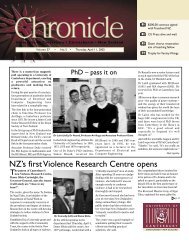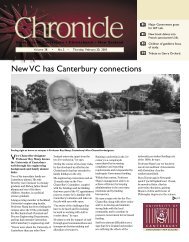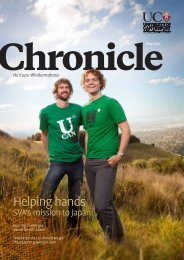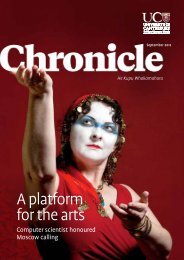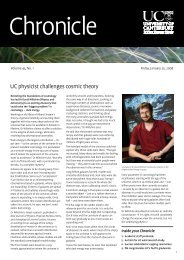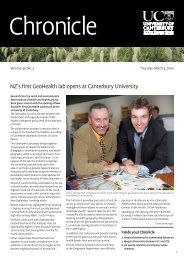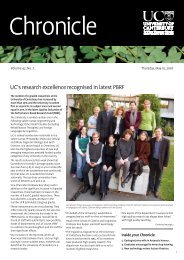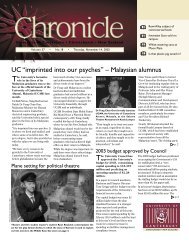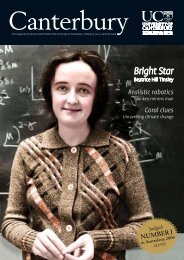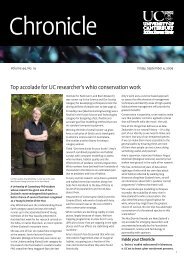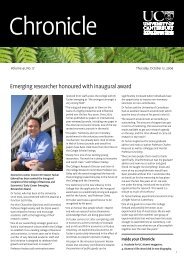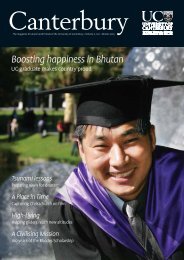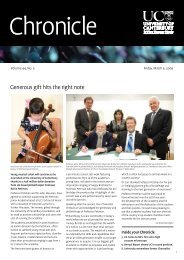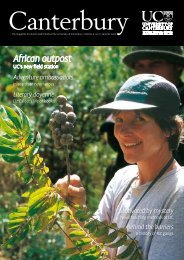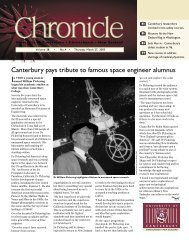No 11 July 18 2002 - Communications - University of Canterbury
No 11 July 18 2002 - Communications - University of Canterbury
No 11 July 18 2002 - Communications - University of Canterbury
Create successful ePaper yourself
Turn your PDF publications into a flip-book with our unique Google optimized e-Paper software.
Photo by Duncan Shaw-Brown, C&D<br />
Colloquium for school students a success<br />
“Globalisation: A contested<br />
idea in a contested world”<br />
was the topic <strong>of</strong> a colloquium<br />
for academically talented year<br />
13 (seventh form) students at<br />
the <strong>University</strong> last week.<br />
Nearly 90 students gave up a day<br />
<strong>of</strong> their holidays to take part in<br />
the colloquium on <strong>July</strong> <strong>11</strong>. The<br />
day was organised by the<br />
<strong>University</strong> chapter <strong>of</strong> the Golden<br />
Key Honour Society and hosted<br />
by the <strong>University</strong>.<br />
Secondary schools throughout<br />
<strong>Canterbury</strong> were asked to<br />
nominate up to three<br />
outstanding students to attend<br />
but the criteria for selection<br />
were left to each school.<br />
Students took part in a series <strong>of</strong><br />
workshops presented by<br />
<strong>University</strong> staff from <strong>11</strong><br />
departments. They were<br />
challenged to stretch their<br />
thinking outside the square<br />
about globilisation and related<br />
issues.<br />
Jessica Thorn from Marian<br />
College took part in the<br />
workshop on globalisation and<br />
sport. She concluded it was not<br />
just the sporting participants<br />
who had a responsibility to<br />
society, it was sporting<br />
organisations and organisers as<br />
well.<br />
“It was good to meet lots <strong>of</strong> other<br />
people. We experienced so<br />
many ideas and it’s important to<br />
realise what is going on around<br />
us. As young people, we need<br />
to take responsibility for our<br />
actions.”<br />
Sixteen <strong>University</strong> <strong>of</strong><br />
<strong>Canterbury</strong> students, who are<br />
members <strong>of</strong> the Golden Key<br />
Honour Society, facilitated<br />
discussion in the workshops.<br />
<strong>University</strong> students in the top<br />
15% <strong>of</strong> their year are invited to<br />
join the society, which<br />
recognises and encourages<br />
scholastic achievement and<br />
community involvement.<br />
Golden Key co-ordinator Tracy<br />
Murdoch, in the third year <strong>of</strong> a<br />
psychology degree, said the day<br />
had been very successful.<br />
“The students came in a bit<br />
intimidated. Our job was to<br />
spark discussion. They walked<br />
away forming their own views<br />
on globilisation.”<br />
Tracy said <strong>University</strong> staff<br />
seemed impressed by the way<br />
students processed the<br />
information presented in the<br />
workshops and the way they<br />
presented their conclusions<br />
back to the whole group.<br />
The colloquium was the first<br />
held by the society at the<br />
<strong>University</strong> and another is<br />
planned for next year.<br />
More information about the<br />
Golden Key Honour Society is<br />
available at http:/<br />
goldenkey.gsu.edu<br />
Lynette Hartley<br />
Comment sought on greater health<br />
sciences role for <strong>University</strong><br />
The <strong>University</strong> <strong>of</strong><br />
<strong>Canterbury</strong> has the<br />
potential to play an increasing<br />
teaching and research role in<br />
the health sciences and<br />
comment is being sought on a<br />
paper proposing the<br />
establishment <strong>of</strong> a health<br />
sciences centre at the<br />
<strong>University</strong> to co-ordinate and<br />
nurture this field.<br />
Historically, health education and<br />
health care have been equated<br />
with medical schools and<br />
hospitals but there is increasing<br />
recognition that health care<br />
comprises more than just<br />
hospital-based services, and<br />
education for health-related<br />
careers can come from a variety<br />
<strong>of</strong> institutions.<br />
The discussion paper, compiled<br />
by Pr<strong>of</strong>essor Andrew Hornblow<br />
(above), former dean <strong>of</strong> the<br />
Christchurch School <strong>of</strong> Medicine<br />
and Health Sciences and an<br />
adjunct pr<strong>of</strong>essor at the<br />
<strong>University</strong>, looks at the future<br />
direction <strong>of</strong> health sciences in the<br />
The School <strong>of</strong> Forestry is<br />
presenting a series <strong>of</strong> six<br />
lectures on New Zealand<br />
forestry history, starting this<br />
week.<br />
Topics to be covered include the<br />
“History <strong>of</strong> Sand Dune Forestry”,<br />
the “Evolution <strong>of</strong> Radiata Pine<br />
“Silviculture”, the “Development <strong>of</strong><br />
Protection Forestry”, the<br />
region. The paper highlights the<br />
needs for inter-departmental cooperation<br />
and strategic planning,<br />
and for tertiary institutions to<br />
work together.<br />
The <strong>University</strong> already <strong>of</strong>fers a<br />
wide range <strong>of</strong> undergraduate and<br />
postgraduate papers, either<br />
directly or indirectly relevant to a<br />
career in the health field. Health<br />
research and teaching within the<br />
<strong>University</strong> currently includes<br />
health policy, information<br />
technology, environmental<br />
health, medical physics and<br />
bioengineering.<br />
More than 100 postgraduate<br />
students are doing theses in<br />
health-related areas and more<br />
than 60 academic staff are<br />
involved in the delivery <strong>of</strong> healthrelated<br />
courses or have<br />
significant research<br />
collaborations with colleagues in<br />
other health institutions.<br />
Pr<strong>of</strong>essor Hornblow concludes<br />
the paper with four proposals<br />
which would build on existing<br />
strengths and lead the <strong>University</strong><br />
forward as a health education<br />
provider. One is the<br />
establishment <strong>of</strong> a <strong>Canterbury</strong><br />
health sciences centre that would<br />
operate in a similar way to<br />
Gateway Antarctica, providing<br />
core health sciences courses,<br />
fostering inter-departmental<br />
research and encouraging<br />
strategic development.<br />
Copies <strong>of</strong> the discussion paper<br />
are available for comment by the<br />
end <strong>of</strong> <strong>July</strong> from Kathy Watkins<br />
on level six <strong>of</strong> the Registry,<br />
phone 364 2496 or extension<br />
8810.<br />
Lynette Hartley<br />
History <strong>of</strong> forestry in New Zealand<br />
focus <strong>of</strong> lecture series<br />
“Introduction <strong>of</strong> Economic<br />
Forestry” and “Innovation in Forest<br />
Products Processing”. They will be<br />
presented by forestry staff and<br />
people involved in commercial<br />
forestry.<br />
All the speakers have had long<br />
careers in the New Zealand<br />
forestry sector and can speak from<br />
first-hand experience.<br />
3



